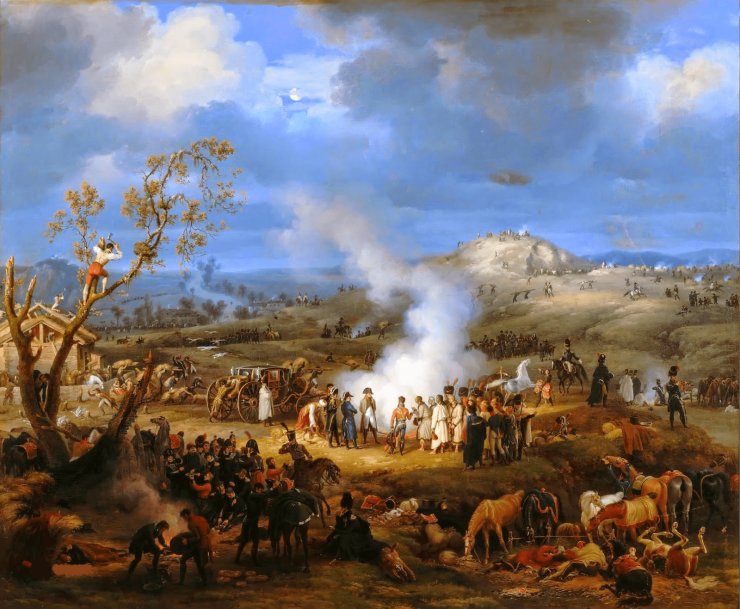Jako že být Kutuzov, tak ty frantíky zaženeš spátky k Brnu? 
2.12.1805 Battle of Austerlitz
Categories: Years of war and revolution , Calendar

At the beginning of December 1805, at the Battle of Austerlitz, also known as the Battle of the Three Emperors, the then thirty-six-year-old Napoleon Bonaparte achieved his most famous victory. This despite the fact that he was facing an army of 90,000 Austrian-Russian allies.
When the Russian general Kutuzov heard of the Austrian surrender at Umlu, he retreated east, allowing Napoleon to capture Vienna. The pursuit of the Russians put Napoleon's army in an increasingly precarious situation. Winter was at the door, and the French soldiers were marching through the country which the Russians had left devastated.
Napoleon resorted to gambling: he intended to get the enemy to fight as quickly as possible before the Austrians brought new forces into play. He found the battlefield of his imagination near Austerlitz. "There he tried to give the impression that he was preparing to retreat. He therefore cleared the strategically important Praka Highlands nearby. He also deployed his troops in such a way that everything indicated that the weak points were on his right flank, where the line of the Golden Stream was only poorly protected," writes R. G. Grant in his book Battles.
Kutuzov probably would not have fallen for this ambush, but Emperor Francis I of Austria and Tsar Alexander of Russia were eager for a bold offensive. The Austrian generals didn't take Kutuzov too seriously and orchestrated a bold plan to break through the French right flank. At dawn on December 2, the Allies attacked and threw their main force against the French right flank.
Without delay the French deployed Davout's reinforcements to counter the emerging threat, and the Russian infantry then became bogged down in the soggy terrain around the Golden Brook. As Napoleon had hoped earlier, his opponents threw more forces against his right flank, but this was to the detriment of the centre. At about nine o'clock in the morning he ordered Soult to return with his corps to the aforementioned Praka Highlands.
The soldiers emerged from the mist that shrouded the valley and stood on the empty plateau quite unexpectedly. Kutuzov threw the Russian Imperial Guard cavalry into the fray to recapture the highlands, but Napoleon responded by deploying his Imperial Guard cavalry to drive the Russians from the highlands once again.
"Then Soult could again afford to send his men into the rear of the enemy, who was still fighting the marshes of the Golden Stream. On the opposite flank, the Russian commander, Prince Bagration, did not record a significant success. Even his men fell back in the heat of battle, Napoleon achieving his greatest victory. The Austrians immediately began to negotiate peace, while the Russians withdrew to Poland," Grant writes.
Source.
www.wikipedia.org
The article is included in categories:
Post
Bonaparte je moje srdcovka.Byl jsem v Ajacciu i v domě jeho rodičů v Corte.Korzičani jsou hoooodně horkokrevní.Radím nesmlouvat tam o ceně!
Kolik vojevůdců, si mohlo kdy bitvu předem připravit. Napoleon byl u Slavkova stratég i klikař zároveň.
Pěkně mu tak skočili na špek!!!
Já se nemohu zbavit mnohaletého obdivu jak k revoluci, tak k osobě Napoleona. Je mi jasné, že tady mohu dostat kázaní o těch horách mrtvol z revoluce a je to pravda. Přesto, nic neovlivnilo moderní dějiny Evropy jako Francouzská revoluce. A není hezčí hymny než Marseillaisa (tedy Zachovej nám hospodine a Hej Slované taky docela jdou). 
Souhlasím. Lidé řeknou, byl středověk a novověk. Ale ono je to trochu jinak. Byl středověk, novověk a dnes je moderní doba. A fr. revoluce je hranice mezi posledními dvěma epochami. Určitým podnětem k fr. revoluci byl boj o nezávislost v severní Americe, kterou francouzský král podporoval proti angličanům. A paradoxně deklarace nezávislosti byla jednou z rozbušek revoluce jež krále popravila. Ne náhodou byl velvyslancem amerických vzbouřenců před revolucí ve Francii Benjamin Franklin a dokonce zde vypracoval části textu deklarace, protože v ní vyšel z Voltairových myšlenek. Nabízím úryvek , který je právě o lidské svobodě a štěstí:
"Pokládáme za samozřejmé pravdy, že všichni lidé jsou stvořeni sobě rovni, že jsou obdařeni svým Stvořitelem určitými nezcizitelnými právy, že mezi tato práva náleží život, svoboda a sledování osobního štěstí. Že k zajištění těchto práv se ustanovují mezi lidmi vlády, odvozující svoje oprávněné pravomoci ze souhlasu těch, jimž vládnou. Že kdykoliv počne být některá vláda těmto cílům na překážku, má lid právo ji změnit nebo zrušit a ustanovit vládu novou, která by byla založena na takových zásadách a měla svoji pravomoc upravenou takovým způsobem, jak uzná lid za nejvhodnější pro zajištění své bezpečnosti a svého štěstí."
Francouzský král po přečtení deklarace údajně příšerně zuřil a okomentoval ji slovy : to je náš konec" Je o tom i slavný román Lišky na vinici. 










